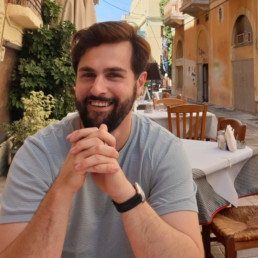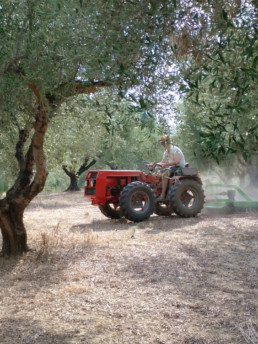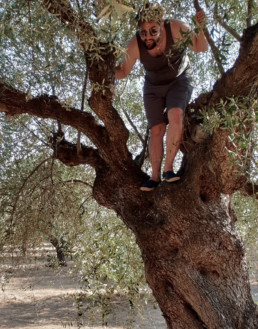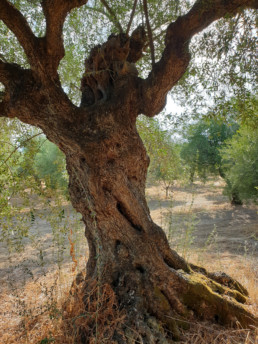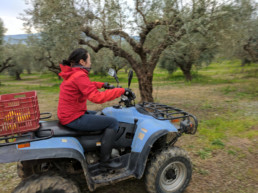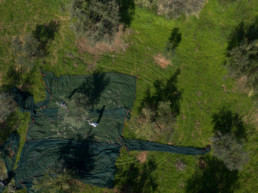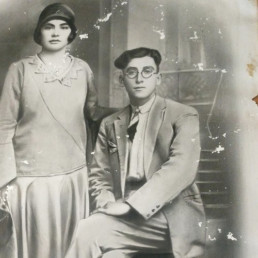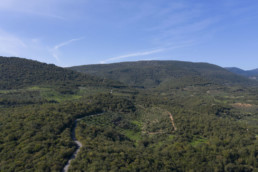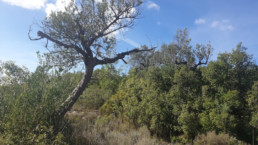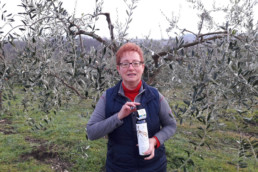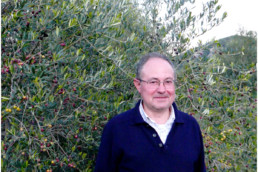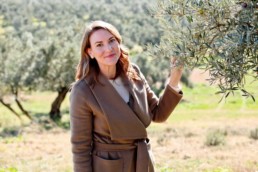INTERVIEW
Meet Mikael Panagiotis Livas of Kala & Mata
By Maria Lovchina | Photo credit: Kala&Mata | 29.03.2021
In this interview, we spoke to Mikael Panagiotis Livas, cofounder of Kala&Mata, on how together with his wife Serena he managed to turn a family olive farm into a mindful international business. Their estate is located in Greece, the head office is in Sweden. Shipping zones include Europe, Asia and North America.
— Could you say a few words about Kala&Mata?
— It is our family farm in Greece. It was there long before me and even my grandfather. It has been in our family for at least five generations. But previously it didn’t have a name. We produced and sold to someone else who sold to someone else; and then our oil would stand nameless in some grocery store. I felt that we were not represented in the fairest way.
We wanted to change that. So we created our own brand and opened our head office in Sweden.
Kala&Mata is a play on words that we made using the word Kalamata [the Kalamata olive variety and the name of the region Kalamata]. We thought it would make a good name for a company.
Now we are a brand. It represents our farm. We mostly focus on overseas markets. We have just shipped a container of packaged organic Koroneiki olive oil to a new Chinese client. And we are currently in talks with partners from the USA, Canada and the UK.
We also went as far as to participate in the 2020 Great Taste Awards [The world’s largest and most trusted food and drink awards]. We were very happy to win a two-star award for our Stavros’ Wild Olive Oil.
— What led you to your current role at Kala&Mata?
— I was born in Sweden and went to school there as well, but spent every summer back in Greece with my grandparents on the farm. When they passed, the responsibility of taking care of the farm fell onto my father’s generation. I was just a teenager back then, but I naturally became more personally involved in the process as well.
Later I moved abroad and worked in business economics and marketing spheres for a number of years. Eventually I returned to Sweden. And then during one of our visits to our farm in Greece, my wife Serena convinced me that the time was right to realize my childhood dream of turning our family farm into something bigger.
I always wanted to do something about it. But I didn’t have a clear idea what. When my wife tried our olives at my father’s table for the first time, she was very impressed. But to me they were unexceptional. These were our olives, the olives I grew up with. I have never bought olives living in Sweden. We’ve always had my father’s homemade olives. When my grandmother was alive, she prepared 15 kilos every year.
I didn’t reflect on it too much. But Serena said she had never eaten anything better than those table olives.
We also heard some similar remarks from our friends in Sweden when they tasted our olives or our extra virgin olive oil.
It took some time, maybe a year, before we started talking seriously about it as a business. But our Kala&Mata olive oil enterprise really started from that point.
I should say that I am not that much involved in the actual work on the farm, as I live and work in Sweden. I am in Greece a few times a year, during the harvest and some other times too. But my family is there. They take care of the trees, prune and trim them and oversee the rest of the farm jobs.
– Is it challenging to run a business as a couple? How are your roles distributed within the team?
– For us it has not been challenging. It works really very well. We do slightly different things. Some of our responsibilities overlap. I am more engaged in the general management part, most of the paper work and accounting.
Serena is more into the creative, marketing and business development part. She covers finding new partners, for instance. But there is an overlap in our functions, too. We always reach out to each other when someone needs help.
– What are your secrets of peace and balance?
– Peace and balance are the most important things. First of all, we discuss everything. If we have a misunderstanding which is usually due to a miscommunication, we get down to it and resolve that problem. We don’t let it get into our private life. We try to understand what the other person meant, in the first place. We talk everything through immediately if we disagree about something. We try to find some common ground. We do not try to push an idea through. It is never the case of saying: “My plan is better!”, “No, my plan is better!”The advantage is that we have two sets of eyes. We have two perspectives. We do not make impulse decisions. We are more careful because we discuss everything. It works really well.
– You mentioned that your olive farm has been in your family for at least 5 generations. What has changed? What is it today as opposed to what it was before?
– When my grandparents were alive, besides olive trees, we also had a number of other fruit trees. We had figs, grapes and many things like that. But it was quite hard to manage those trees. The results were uneven. Some harvests didn’t turn out at all. For many years they were losing money for that reason. But they continued cultivating it that way, because they always had. When they passed away and the farm went to my father’s generation, we decided to give all of the land over to olive trees, Kalamata and mostly Koroneiki.
That was a big change. My grandparents used pesticides to eradicate weeds. We don’t do any pesticides. Everything is done solely by mechanical means. Tractor with chains is used to get rid of weeds in between the trees. We try to avoid anything that can do harm to the environment, to the food we produce and consequently to human health. That’s a big change, too.
I think that is a generational thing. My grandparents didn’t really realize the damage caused by pesticides the way we do. That has to be the biggest change.
We are becoming Climate Neutral Certified later this year. That means that we will fully offset our carbon footprint.
– What remained unchanged?
– There are many things that are exactly the same as they were years ago. We do pruning the same way. We do harvesting by hand, as my grandparents did, and as it had been done before. We have a new tractor – that’s about it. But everything else is the same. All of those agricultural practices were passed on from generation to generation. We are open to new knowledge and eager to learn about how other farmers do it. But for now, apart from not using pesticides, we still do everything the same old way, manually.
Antonis and his wife Olga
«We drive up into the mountains on a pickup truck – as far as it can go. Then we walk. This year we harvested in an area around the hills of Aristomenis, located at around 15 km from our village and at 500-600m above the sea level. It is mostly wilderness there and there are very few villages»
– You also have STAVROS’ WILD OLIVE OIL. The extra-virgin olive oil from wild olive trees. How is it produced? How do you pick the olives?
– We drive up into the mountains on a pickup truck – as far as it can go. Then we walk. This year we harvested in an area around the hills of Aristomenis, located at around 15 km from our village and at 500-600m above the sea level. It is mostly wilderness there and there are very few villages.
It is not that easy to find olive trees there. It is not just rocks where you can easily spot an olive tree. These hills are very green. There are many other trees, too. The olive trees are scattered. No one planted them. Birds drop and distribute seeds across the land. You have to really look for the olives to harvest, come close, check if it really is an olive tree, whether it bears fruit – very few of them do. It is somehow similar to mushroom picking in a forest in Sweden.
The hills of Aristomenis
– Do you have to take ladders with you? The trees must be really tall.
– As for the step ladders. We have them. But the wild olive trees here do not really require much of that. They are not very tall, not much taller than an average person. They look more like thin shrubs. They are not perfectly shaped and look wild. We pick olives by hand, put them in a burlap sack and bring that back to the truck. It should be then taken immediately to the mill to press the oil. So it takes time and effort. But the result is amazing. It is a completely different flavor.
– Is it more pungent?
– Yes, it is. The flavor reminds me of jasmine flower. But it is not like comparing Koroneiki and Coratina varieties. It is a different species. The cultivated olives that are grown in orchards all over the world belong to the Olea europaea species. But this one is Olea oleaster, the wild olive. Even though we can only offer it in small volumes – this year we got only 30l – it makes a very fun and significant gift. We created it as a limited edition of around 100 items. We numbered them and wrote the numbers by hand on every bottle.
A wild olive tree
«Find an olive oil that gives you a feeling that it elevates flavors in any food that you put it on. You add it to something and suddenly this dish is ten times better than before. I think that it is a good criterion»
